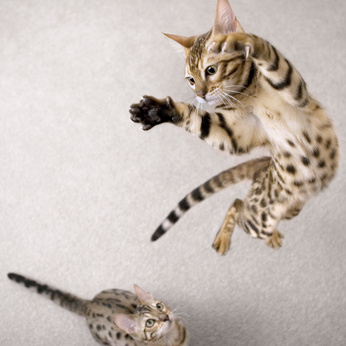Sense of smell: cat's sense of smell is fourteen times stronger than a human's. Cats depend on their sense of smell to survive. It is their most important sense. Cats use scent to find food, mates, enemies, their own territory... their life depends greatly on how accurate their sense of smell is.
Cats have a wide range of vocal sounds.They can make about 100 different sounds. Dogs only make about 10.
Cat's eyes are pretty incredible. They do not see better than humans (in human terms) but their eyes have a different purpose. They smell the world (humans "see" the world). Cats use their eyes to hunt, they need to find the prey and focus on movement (not details). They can also see without much light. Cats have a wider field of view (200 degrees, compared to humans' 180-degree). Cats also have a greater range of peripheral vision, all the better to spot that mouse in the corner. Cats are crepuscular, meaning they are active at dawn and dusk. That may be why they need such good night vision. Their eyes have six to eight times more rod cells, which are more sensitive to low light, than humans do. In addition, cats' elliptical eye shape and larger corneas and tapetum, a layer of tissue that may reflect light back to the retina, help gather more light as well. That is why their eyes shine at night.
Your average healthy housecat with no training, no conditioning, no stretching, and no carb or protein loading can bolt at an amazing speed of about 30 mph (The average man jogs at a speed of 8.3 mph). All the cat would need for such an athletic feat is a little motivation. Cats can jump as much as five times their height. (a man jumping nearly 30 feet).
Your iPad does about 170 million operations per second. Your cat’s brain does 6.1 trillion operations per second. Researchers also say that short-term memory of cats (at least when it comes to recalling where food was hidden) lasts about 16 hours. For dogs, it’s only about five minutes.
We know cat's tongues are scratchy. That sandpaper feel is because a cat's tongue is lined with tiny elevated hooks called papillae that help hold prey in place. And unlike dogs that “scoop” water into their mouths – and all over the floor – cats use the tip of their tongue to pull water upward, closing their jaws before gravity causes spillage, in an impressive four laps per second.
On average, the lifespan of a cat is 12 years (64 human years) while dogs average 11 years (60 human years). In the past two decades, cats’ longevity increased 10 percent, more than twice as much as dogs. Some cats live up to 20 years. The oldest cat in history was Creme Puff (born on 3 August 1967 and lived until 6 August 2005) - an amazing 38 years!
At Kitty in NY we love your cat! When you have to leave the city for a few days (or weeks) we'll be glad to help you take care of him/her, until you come back. We propose a wide range of pet-free homes with caregivers who love cats. Your cat will be the only pet in the apartment. We also propose cat sitting services for shorter periods. Our cat care services are the best in the city! Contact us with more details about the service you need.


 RSS Feed
RSS Feed

